#Custers last stand
Explore tagged Tumblr posts
Text
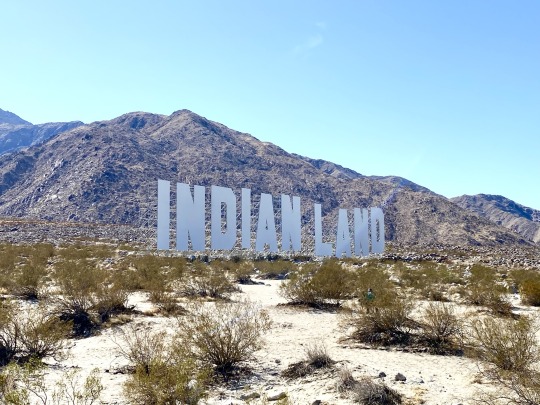
Happy Victory Day 🖤❤️💛🤍
#lakota#crazy horse#sitting bull#Buffalo calf woman#victory day#Custers last stand#greasy grass#palm springs#never forget#art installation#little big horn#🖤❤️💛#my photos#nature photography#landscape photography#photographers on tumblr
57 notes
·
View notes
Text




ghosts of the Little Bighorn
111 notes
·
View notes
Text

Custer's Last Stand by Newell Convers Wyeth
#newell convers wyeth#n. c. wyeth#n.c. wyeth#art#battle of little bighorn#america#american#american indian#native american#history#george armstrong custer#north america#united states of america#us army#american indian wars#lakota#great sioux war of 1876#guns#battle#custer's last stand#united states#usa#u.s.a.
57 notes
·
View notes
Text
On this day, June 25, 1876, Lakota, Cheyenne and Arapaho coalition forces defeated George Custer’s 7th Cavalry at the Battle of Little Bighorn.


11 notes
·
View notes
Text
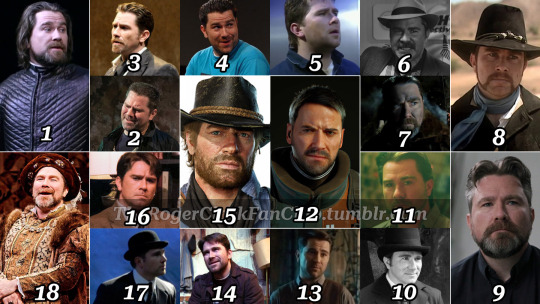
This is the latest update to my header image 😊, at least until Damn Handy and Fruili come out.
If you happen to be wondering which are the characters he's playing, I got you covered fam 😉
Duke Theseus - A Midsummer Night's Dream
Bradley - Buried Child
Lord Henry - The Picture of Dorian Gray
Kevin - Comp
Chuck Brewer - Perfect Disaster
Brian McNeely - A Death to Die For
"Guard 1" - Rawmouth
Captain Wier - The Wild West (Episode: Custer's Last Stand)
(As himself) - Hazardous
Randolph Blythe - A Writer's Retreat
The Boss - Happy Birthday To Me
Jack Leary - Fort Solis
"Patron" - Zero Hour
Chris - In Your Image
Arthur Morgan - Red Dead Redemption 2
Michael Starkwedder - The Unexpected Guest
Matt Burke - Anna Christie
King Henry VIII - A Man For All Seasons
#roger clark#arthur morgan#a man for all seasons#duke theseus#a midsummer night's dream#the wild west#the picture of dorian gray#red dead redemption 2#custer's last stand#anna christie#Seriously‚ No. 15 doesn't even need an introduction but I had to do it for the sake of consistency 😂
34 notes
·
View notes
Text









"June twenty-fifth 1964 - or, if you prefer, June twenty-fifth 1876. The cast of characters in order of their appearance: a patrol of General Custer's cavalry and a patrol of National Guardsmen on a maneuver. Past and present are about to collide head-on, as they are wont to do in a very special bivouac area known as... the Twilight Zone."
THE TWILIGHT ZONE | 5.10 The 7th Is Made Up of Phantoms (1963)
#thetwilightzone#ttz#thetwilightzoneedit#thetwilightzonegifs#1960's#1960s tv#1963#retrotv#retrotvgifs#filmtvcentral#tvdaily#season 5#5.10#5x10#the 7th is made up of phantoms#1960s television#tv#ron foster#warren oates#randy boone#robert bray#rod serling#custer's last stand#george armstrong custer#army national guard#little big horn
4 notes
·
View notes
Text
Did Buffalo Bill invent the Wild West?
Buffalo Bill is often accused of having invented a fake Wild West in his shows but TV historian Tony McMahon begs to differ
You’ve heard of Annie Oakley, Calamity Jane, Chief Sitting Bull, and of course – Buffalo Bill. Those great heroes of the Wild West who created the United States of America. Frontier folk laughing in the face of danger. Battling the fearsome Sioux and Cheyenne. Free spirits living by their own code of honour at the expanding new frontiers of America. A tough life punctuated by gunfights and…
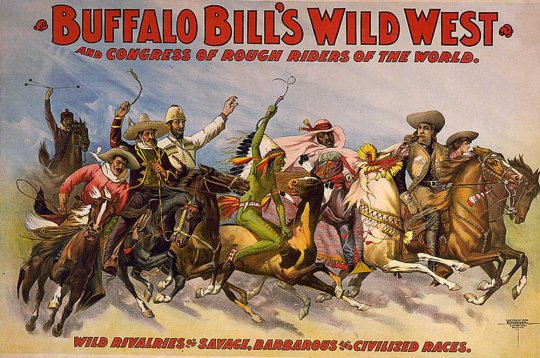
View On WordPress
#African American cowboy#Battle Little Bighorn#Bill Cody#Buffalo Bill#Buffalo Bill Edison#Calamity Jane#Cody Kansas#Cody scalping#Custer&039;s Last Stand#Edison cowboy films#General Custer#history#Sioux Cheyenne#Sitting Bull Buffalo Bill
2 notes
·
View notes
Text
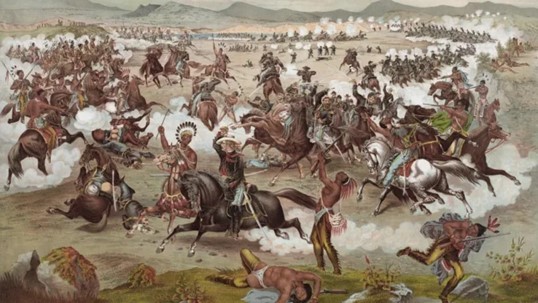
Horse warfare between Lakota and other Plains Indians and the U.S. Cavalry during the Battle of Little Bighorn , 1876.
Artist name and date??
Notes:
In 1876, General Custer and members of several Plains Indian tribes, including Crazy Horse and Chief Gall, battled in eastern Montana in what would become known as Custer's Last Stand.
The only survivor was a horse.
#Lakota tribe#Plains Indians#U.S. Cavalry#Battle of Little Bighorn#horse#war#Custer's Last Stand#Crazy Horse#Chief Gall#Montana#General Custer
2 notes
·
View notes
Video
youtube
Custer's Last Stand | Part 8 | The Final Showdown

0 notes
Text
Did Buffalo Bill invent the Wild West?
Buffalo Bill is often accused of having invented a fake Wild West in his shows but TV historian Tony McMahon begs to differ
You’ve heard of Annie Oakley, Calamity Jane, Chief Sitting Bull, and of course – Buffalo Bill. Those great heroes of the Wild West who created the United States of America. Frontier folk laughing in the face of danger. Battling the fearsome Sioux and Cheyenne. Free spirits living by their own code of honour at the expanding new frontiers of America. A tough life punctuated by gunfights and…
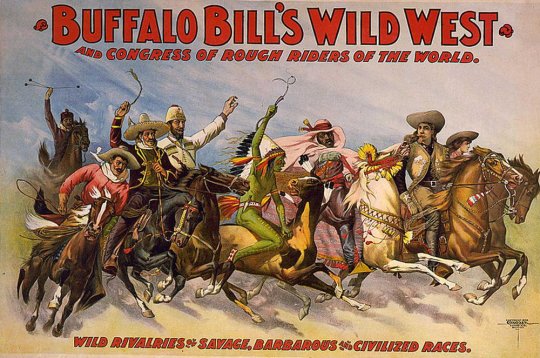
View On WordPress
#African American cowboy#Battle Little Bighorn#Bill Cody#Buffalo Bill#Buffalo Bill Edison#Calamity Jane#Cody Kansas#Cody scalping#Custer&039;s Last Stand#Edison cowboy films#General Custer#history#Sioux Cheyenne#Sitting Bull Buffalo Bill
1 note
·
View note
Text
Custer
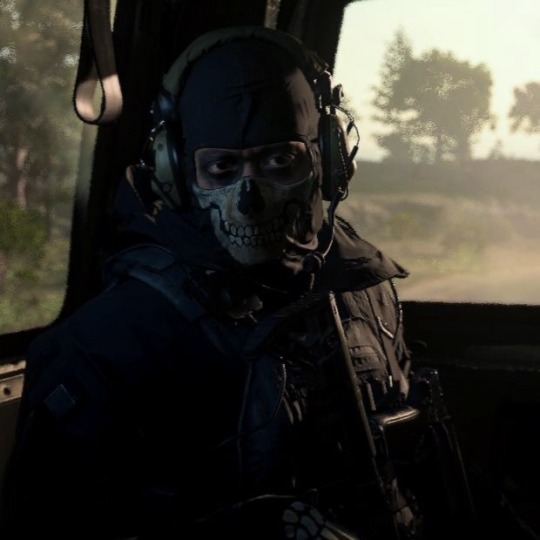
Pairing: Ghost x GN! Reader, no use of (Y/N), First POV
Word Count: 908
About: After an accomplished mission, Ghost is intrigued by the music he can hear you blasting in your earbuds.
Themes: None really, just a little drabble of Ghost and reader interacting.
Notes: The song featured in this short is Custer by Slipnot. Highly recommend it if heavy metal is your style! Nickname for this one is Puppy. Enjoy!

Cut cut cut me up and fuck fuck fuck me up
Cut cut cut me up and fuck fuck fuck me up
Cut cut cut me up and fuck fuck fuck me up
Cut cut cut me up and fuck fuck fuck me up
Cut cut cut me up and fuck fuck fuck me up
“Mission well done, everyone.” Price announced, gazing over all of us.
Irreverence is my disease
It's secondhand, but you know me
The son of a bitch is on his knees
The last man standing gets no pity
We were currently heading back to our base and while everyone else was talking, I was destroying my hearing with my music. Couple of months ago, I joined Task Force 141, sworn in by Captain Price and so far I have enjoyed my stay here. Some missions are hard as fuck, take months and months to accomplish, while some others, like todays, only take a day or two to do and while I do love what I do, I also love being at our base. I keep to myself for the most part, whether I be walking outside or in my bunk reading a book while listening to music. It’s not that the guys don’t like me, I mean hell, they also invite me to play a game of pool or poker with them, most of the time I turn it down because I just want to do my own thing. You can’t really afford to make close friendships or even relationships in this line of work, you never know when something may happen to one of ‘hem. Soap can be an ass sometimes but he is cool and very outgoing. Gaz is the nicest of the lot, but can sometimes be too nice for his own good. Price is the definition of an old grumpy man, and can definitely act like one for sure, but he very much would take a bullet for one of us. Now Ghost, who happens to be sittin’ right next to me in this crowded vehicle, I haven’t figured out yet. He will mumble a hi if I am passing by or make a comment here and there, but he seems to be like me, likes to keep to himself. He is the closest with Soap by far, but even then I don’t really see them hanging around base as much as you think they would since they are close.
You try so hard to be difficult
You want to win the war?
Know what you're fighting for
Hell yeah, it’s my favorite part. I began bumping my leg to the beat of the music as well as tapping my knee as if I was an old, country man in the West.
Cut cut cut me up and fuck fuck fuck me up
Cut cut cut me up and fuck fuc-
I swear I felt someone nudge my shoulder, but I didn’t pay any mind to it as I immersed myself into my music.
-k fuck fuck me up
Cut cut cut me up and fuck fuck fuck me up
Cut cut cut me up and fuck fuck fuck me up
Cut cut cut me up and fuck fu-
Okay someone is definitely tapping me on the shoulder. This better be good. I pulled my earbuds out in a huff.
“You grumpy, Puppy?” A gravelly voice asked me.
Ghost. I sneered at him a little bit for the nickname. For some reason, the task force came up with the nickname puppy for me. The reason for it? Well that I will never know they just started calling me that one day, around the time I first started.
“Nope.”
“Seems like ‘t.” He remarked.
“What is it to ya?” I asked.
“You’re gonna damage ‘our hearing listening to that bloody music that damn loud.” He commented, his big blue eyes piercing into mine.
“Oh so you’re the one that made me put my music away?”
“Never told you to do that.”
Dear lord, this man. As attractive he may be, he can be a real ass sometimes.
“What song was it?”
Ghost? The most grumpy British man to ever exist asking me about what I was listening to? I might as well be honored.
“Custer by Slipknot.” I answer.
“Slipknot? What kind of band is that?” Ghost asked.
Is this really Ghost or did he bump his head during a mission or somethin’?
“They are a heavy metal band that started in the mid 90’s. Custer is one of their most popular songs but it is one of my favorites.” I added.
I could tell Ghost was processing what I said because he nodded his head in response and didn’t say a word back. So it’s up to me aye?
“What kind of music do you listen to?” I asked him.
“Hm. Some rock, some alternative, some reggae.” Ghost listed.
“Reggae? Really?” I questioned, not expecting that answer.
“Hey, don’t diss Bob Marley till you try ‘im.” Ghost remarked.
“I’ll give him a try, L.T.” I said, shoving his shoulder with mine.
I could see he rolled his eyes in response, but in a sarcastic way.
“And I’ll Slipkno’ a try.”
“SlipknoT.”
“Don’t test me puppy.” Ghost growled a little, making me laugh, in which he eventually let out a chuckle.
Ghost is definitely not as bad as everyone seems like he is, he just needs the right person to break down his walls.
END
#simon riley x reader#ghost x reader#simon riley x you#simon ghost x reader#simon ghost riley#simon ghost riley x reader#cod#call of duty#modern warfare x reader#cod modern warfare#cod x reader#call of duty x reader#cod mw2 x reader
198 notes
·
View notes
Text

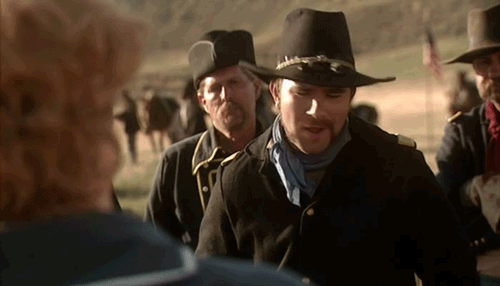
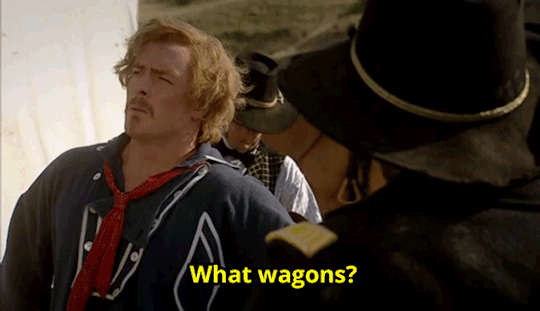
ROGER CLARK as Captain Weir in:
The Wild West (2007) Season 1, Episode 1: "Custer's Last Stand"
⭐ Watch Custer's Last Stand on DailyMotion. ⭐
(GIF Set 1/6)
#roger clark#the wild west#custer's last stand#toby stephens#westerns#documentaries#bbc#general custer#george armstrong custer#irish actors#my edits#my gifs#tv series#historical events#us history#roger's filmography#roger's tv shows#battle of the little bighorn#lakota nation
73 notes
·
View notes
Note
Aita for getting off work earlier than I should?
I (27F) work as a cashier in a hypermarket, there's a total of 60 cashiers here, while we have around 6 supervisors. It's the supervisors' job to clock us in and out, so they need to be attentive to our schedule and keep an eye on who's late. But because there are so many of us it's hard to keep track, the supervisor work is very difficult and I don't blame them for making mistakes.
I'm always on time, so supervisors always clock me out on schedule since I'm known for my punctuality. But on the very rare occasions I'm late, they often miss this and try to clock me out earlier than I should be. Everything is documented so I worry that if the management finds out about this, the poor supervisor will be held accountable for this mistake, not me. That's why every time they forget I'm late, I actually inform them so they don't accidentally clock me out earlier. After a while they started depending on me, asking me if I was on time or late and they trust me to answer them honestly. They don't often do this, just when they aren't sure, however I feel there's a sense of trust, that they know I'll remind them whenever they forget so they never check the time before clocking me out.
Anyway, for 2 consecutive days I was given the job i hate most, I was assigned the express counter where I'm required to kick out any customer who brings more than ten items. It's hard for me see people's carts clearly without standing up and many custers lir about the number of their items, the other cashiers are somehow able to do it sitting down, I tried that but I couldn't. I have back problems and standing for a long time causes me pain but other than that there's no serious damage. I was fine the first day but when I was assigned the same counter the next day I requested to be removed politely, I wasn't pushy with my request and I didn't explain why (I never mentioned my back problems because i'm rarely assigned this counter and because there's no rule that states i have to stand up) that's why my request got ignored and I had to continue working there for the rest of the shift.
Here where I think i might've been TA: I was too tired in the last hour of my shift, my back pain was getting worse and I needed to rest. I was 20 minutes late that day but my supervisor didn't know it and clocked me out. I didn't remind her as I would usually because I wanted to rest. I think she assumed I would always let her know if I were late but I didn't this time. Of course she wouldn't be punished for a one time thing and she'll probably never find out about it but I still feel guilty, it's like I broke her her trust. Specially because I could have solved the problem in a different way, I could request a short break to rest or I could actually speak up about my back pain so my request to be removed from the express counter would be taken more seriously so AITA?
What are these acronyms?
62 notes
·
View notes
Note
Could you recommend any books like Black Hawk Down about military battles that are real detailed and feel like novels like Black Hawk Down did?
That's a pretty high bar that you're setting! Mark Bowden's Black Hawk Down (BOOK | KINDLE) is one of the best books of that genre of the last few decades.
Obviously, there are tons of great books about military conflicts and specific battles, but I think I understand what you're looking for. Instead of the more history-focused studies, you are thinking of something vivid that feels like the author was embedded with the troops, right? Here are a few that come to mind: 13 Hours: The Inside Account of What Really Happened in Benghazi by Mitchell Zuckoff and the Annex Security Team (BOOK | KINDLE | AUDIO) I'm a fan of many of Mitchell Zuckoff's books. He's a great writer and his books usually end up being really exciting and impossible to put down. I wasn't all that hyped to read about what happened in Benghazi because it was such a tragedy and dark moment in the Obama Administration, but Zuckoff (with the help of the surviving team of CIA contractors and special operators who were involved in that battle) wrote an incredible book. It's obvious why they quickly made this book into a film. It's one of those books that you basically have to read in one sitting because it's such an intense experience.
Horse Soldiers: The Extraordinary Story of a Band of U.S. Soldiers Who Rode to Victory in Afghanistan by Doug Stanton (BOOK | KINDLE | AUDIO) Another book that was turned into a film (12 Strong), this is the story of the small teams of special operators and CIA paramilitary officers who went into Afghanistan just a few weeks after 9/11. The teams -- usually of less than a dozen men -- met up with Afghan tribal leaders who had been fighting against the Taliban for years, and started what would eventually become the War on Terror. They were in such remote, hard-to-navigate terrain that they ended up riding into battle with their Afghan warlord allies on HORSES.
First Casualty: The Untold Story of the CIA Mission to Avenge 9/11 by Toby Harnden (BOOK | KINDLE | AUDIO) Harnden's book is also focused on those small CIA teams that were covertly inserted into Afghanistan immediately after 9/11 and laid the groundwork for the eventual U.S. invasion, with a particular focus on the first American casualty in the War on Terror, Mike Spann, a CIA agent killed during an uprising by prisoners (including American Taliban John Walker Lindh).
The Last Stand: Custer, Sitting Bull, and the Battle of Little Bighorn by Nathaniel Philbrick (BOOK | KINDLE | AUDIO) Nat Philbrick's books are always vivid and feel like novels. They also feel like they were written by someone who witnessed everything being written about, even if they happened 150 years earlier. The Last Stand is a familiar story, but written with fresh eyes and extensive research, and I think the result is a different experience of something you may feel like you already know everything about. Here's my original review of the book from 2011.
#Books#Book Suggestions#Book Recommendations#13 Hours: The Inside Story of What Really Happened in Benghazi#Mitchell Zuckoff#13 Hours#Horse Soldiers#Horse Soldiers: The Extraordinary Story of a Band of U.S. Soldiers Who Rode to Victory in Afghanistan#Doug Stanton#First Casualty#First Casualty: The Untold Story of the CIA Mission to Avenge 9/11#Toby Harnden#The Last Stand#Nathaniel Philbrick#Military Books#War Books
13 notes
·
View notes
